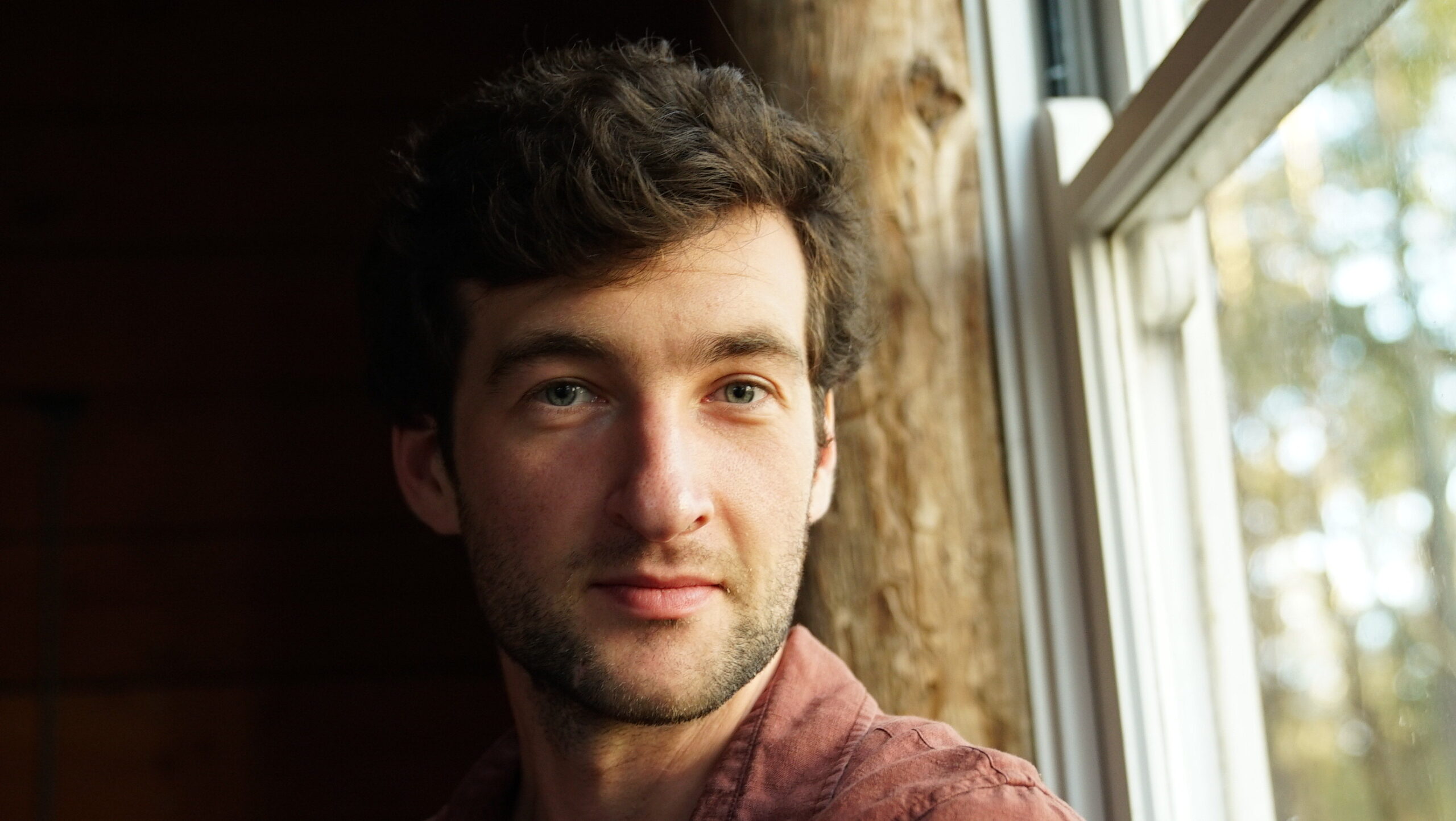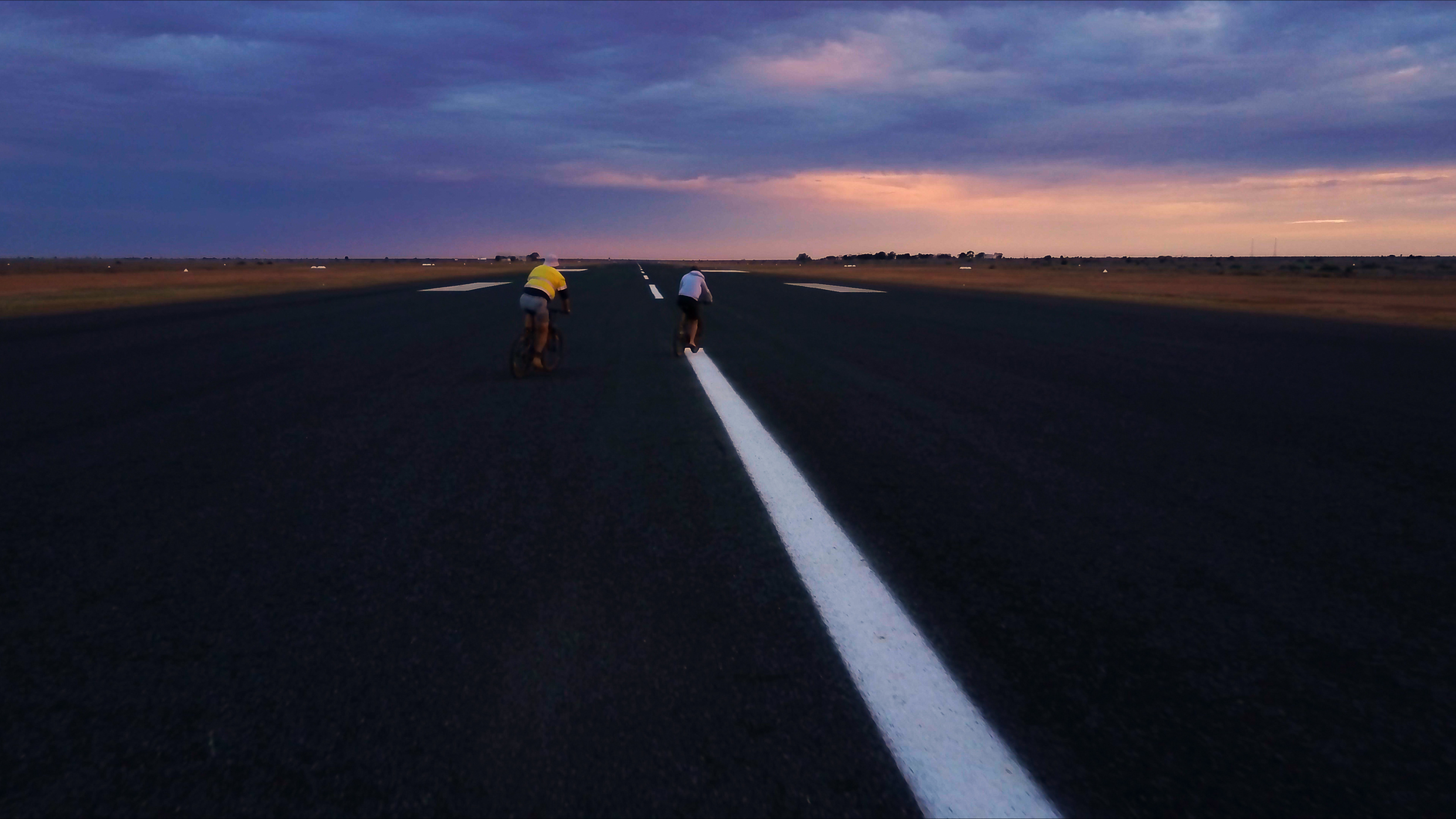So many people I know who have seen Yannick Jamey’s charming documentary “The Big Wait” have said something along the lines of “I think that may be my dream job.” The film depicts a couple who run an emergency airport in the middle of nowhere in Forrest, Australia. This desert town consists of only these two lovely people, Greg and Kate Harrington, who have a street of cottages to keep tidy, just in case a plane happens to make an emergency landing there and the people on board end up stranded. How often does that happen? Hardly ever, but if that were to happen to any one of us, it might not be such a bad day after all.
Greg and Kate’s days consist of pulling weeds from the airport runway, washing and folding the towels in the cottages, dusting, playing racquetball in the airport hanger, driving down the runway at full speed (why not?) and mowing the lawns. They also give each other haircuts and keep in touch with loved ones via Skype. Couldn’t someone go mad out there? This sounds like a desert outback version of “The Shining.” It would probably depend on your temperament. There is a freight train that passes through once in a while, which, if nothing else, lets you know that the world is still turning.
Jamey’s film is a breezy fifteen minutes of quiet contemplation and, for some, wish fulfillment, though the chances of any of us ending up in this settlement is as remote as the setting itself. It’s never explained how these two ended up here, and maybe we shouldn’t know (the inner workings are explained in the Q&A below), but you get the feeling that there are no better people for the job. Ernst Reijseger’s score has the perfect sound to compliment the isolation, while Jamey also lets the quiet landscape do the work of helping the viewer get acclimated to the serene surroundings. So much of the majestic scenery and expansive scenery might remind some of the wondrous shots of the deserts in Wim Wenders’ “Until The End of the World.” In a way, this film is a perfect companion piece to that one.
All year, in this column, I have been writing about films that examine our relationship with technology, how it has grown, how it has consumed us, and how it has helped define our identities. Ending this year’s column with a film about getting away from it all and living a quiet, simple existence feels right (it wasn’t planned). I’m sure next year, there will be more short films that keep exploring these issues, but I’m sure there will be a need for films like “The Big Wait” as well. Jamey’s film feels like a true breath of fresh air, in more ways than one.

How did you find this place/these people? How long were you there with them?
The way we found this place was halfway between seeking it out and stumbling upon it. It is so remote, being about 5 hours on a very rough dirt road away from a highway that is already incredibly remote, that anyone going there has to be seeking it out. But, initially my intention was just to go into the Nullarbor Plain, as I was so fascinated by this landscape of total emptiness, and find people who lived there to see what life was like for them. These people mostly lived on large “stations” or ranches out in the plain, but our filming with them didn’t go so well (it was just a bit too boring, so to speak). Forrest was one of the few places that was on the map as a stopover where you could refuel your car, so we always treated it as a place to pass through, having no idea about it being an airport and all that. But when we got there and met Greg and Kate, we immediately knew this was what we were looking for all along. And luckily, they were up for being filmed then and there on the spot.
We spent just over a week there, getting to know them through filming them. So, there was a real sense of spontaneity to the whole thing. In a parallel universe, the entire town of Forrest could have been a set built for a fiction film. But lucky for us, it already existed in reality and Greg and Kate were the most amazing cast you could ask for, and we just shot it in a week with hardly any money. That’s the best part of documentary filmmaking, when you stumble on a dream (or a nightmare) that’s already there, already built for you and you just have to show up with a camera.
I've talked to people who look at this as a "dream job." What was your personal experience with being out there during that time? Does this kind of peace-and-quiet appeal to you at all?
Yeah the emptiness and nothingness definitely appeals to me. For me personally, that landscape feels extremely comfortable. You can see a pure straight horizon stretched out all around you for 360° and see the entire dome of the night sky… and on top of that, it’s so silent you can’t hear anything but the faintest ringing in your ears. Your brain doesn’t even know how to process it. So when you’re camping alone out there, it’s as if the whole world in its entirety just becomes your room: the Earth is literally your bed and the sky is your ceiling, and you have it all to yourself.
It’s a strange place where what’s going on inside you is also being reflected outside of you in the landscape itself. You’re constantly facing this physical void all around you while simultaneously emptying your mind, doing a kind of fasting of your own thoughts and external stimuli. It doesn’t surprise me that this kind of thing would be a dream job for many people nowadays, and will only become more so. It’s obvious that there’s a common averse reaction to the amount of noise and stimuli in our modern societies now with everything going on online and with AI. Everyone could use a mind detox, and there’s no better place for that than Forrest. Eventually, you would go crazy out there, but the point initially is to go there because you think you’re already going crazy in the city. So it’s a really interesting dynamic. It’s about finding a certain balance between maintaining the structure of society and finding a kind of liberation from it all.
Have you kept in touch with them? Are they still there?
Yes I’m still regularly in touch with them, but they aren’t there anymore. In fact, to my previous point about going mad out there eventually, managers are only allowed to stay 2 years maximum on the job, precisely to avoid going mad. It’s a bit like being lighthouse keepers, but in the desert. So it’s now in the hands of other managers, and there’s a turn over every year or two. Greg & Kate are now living on the east coast of Australia, but will forever be dreaming of Forrest.

The lawnmower shot at the very end is a wonderful choice. Can you tell me a little about what inspired that and how you accomplished it?
When we were talking one evening towards the end of our stay, Greg told me about his mower being “self-propelled”, which means you can trigger the engine to propel itself instead of you having to push it. Werner Herzog has always been one of my dearest inspirations and I share his fascination with machines that can drive by themselves, like the boat in “Fitzcarraldo” or the cars driving in circles in “Even Dwarves Started Small.” So there's definitely some subconscious Herzog in there, but the image just came together that night in that moment: it must end with the lawnmower driving by itself into the endless lawn of the Nullarbor Plain. Has Greg finally gone mad, or has the lawnmower itself gone mad? Or is it trying to escape the madness? I don’t even really care about the meaning… when something like that just comes to you and feels so appropriate for the film, you just can’t let it go. You can’t NOT try to make it happen! So from there, it was really just a question of: is it doable?
The next day we took the mower out into the plain and gave it a shot to see what it would do if we just fastened the self-propelling system with a zip tie and let it go. Immediately, you could see that it was perfectly capable of working and the question was more a technical one about getting the drone movement right and the weather conditions right. I had to practice the drone a bit and we needed a very windless day, so that the dust from the mower wasn’t aggressively going all over the place… so it took a few days to get it right.
What's next for you?
I’m working on a short fiction film, once again involving “crazy” people waiting for something that never arrives. I’m also working on several short, medium and feature length documentaries, mostly about the current diversity crisis, that is, dying cultures, dying traditions and languages around the world. One of them is also about a strange town in Australia where everyone lives underground. For the most part, it seems like I’m interested in diverse worlds, different lifestyles, absurd stuff and uninhibited people challenging our notion of sanity.
from Roger Ebert https://ift.tt/OHMyDae

.png)
.png)

